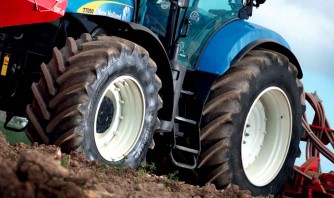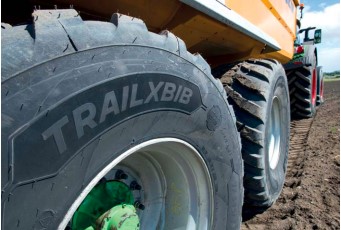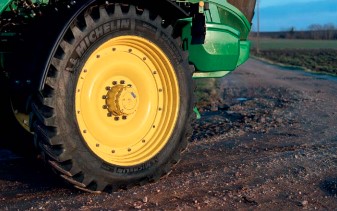TYRE TECHNOLOGIES TAKING SOIL PROTECTION TO THE NEXT LEVEL

With farm machinery getting increasingly heavier, tyre manufacturers are having to work harder than ever to ensure their products are keeping damage in the field to a minimum. Here we speak to Gordon Brookes, Customer Engineering Support Manager at Michelin, to learn more about the latest tyre technologies and why getting the set-up correct is so important.

Do you think agricultural operators are paying more attention to their tyres than they have in the past?
In a word, yes. It’s no great secret that farmers with the optimum tyre and wheel configuration, set-up correctly, can reap many benefits over those that tend to overlook this crucial area of their machinery. After all, those large black, round, rubber things at the bottom of your tractor, harvester or sprayer are the only point of contact between the vehicle itself and the ground it’s working on. At Michelin, we have been championing the importance of tyre choice and running the correct tyres for the job, set at the right pressures for many a decade. Today the farming community is arguably better educated about these decisions than at any time previously, and most farmers understand the huge impact their tyres can have on the soil and the productivity of their fields.
Soil damage can hit your yields hard; it increases the risk of disease and can require major regeneration work to put right. For instance, ploughing or de-compaction consumes considerable fuel and time, ultimately hitting you in the pocket. The consequences of rutting can be equally bad, if not worse – nothing grows in a rut! They also encourage water stagnation, which can asphyxiate plants and encourage the development of disease. The latest generations of high technology tyres on the market can really help farmers to reduce soil compaction and minimise rut formation – so it just makes perfect economic sense to opt for these over standard tyres.
What are the key things to consider when choosing your agricultural tyres?
The first step in the process is making sure you pick the right tyres for the application. You need to consider; where is the tyre going to be working – is it going to be mainly used in the field, or will it be doing a lot of road work? Other things to ask yourself, include; how big a tyre do you actually need for the power of your tractor, what loads will you be carrying, what implements do you intend to use, how are they operated in your system and how much load is required to transmit the power? Once you’ve considered these main points, you’ll be in a better place to make your selection although other considerations may still be required. If possible, it’s always worth specifying your preferred choice of tyre as original equipment. Although it may cost a little extra, getting the right tyre on your new machinery is worth the additional expense. Often, when people buy a new machine, it won’t arrive with the most appropriate fitment for the job they want to use it for.
Not every tyre offered by the manufacturer is necessarily suitable. For instance, it may be able to handle the tractor in its naked capacity, but as soon as you stick a big heavy plough on the back, you may find that the tyres are not big enough to support that piece of equipment. Getting it right at the start is definitely cheaper in the long run. If the tyres can’t cope with the power, for example, then you can end up shredding the rubber in next to no time. Those tyres may have been a few hundred pounds cheaper than the ones you needed, but they’ve suddenly become a very expensive mistake!
How has tyre technology changed and moved forward in recent times?
It is approaching 40 years since Michelin first introduced flexible wall radial tyre technology into agriculture and since then, with the debut of even more flexible products including the Michelin EvoBib, CerexBib and AxioBib ranges, Michelin Ultraflex Technology has proved that tractor tyres can serve more than just one purpose. By using Ultraflex Technology, the tyre can not only be used to improve tractive performance and reduce compaction in the field, but also it can significantly improve ride comfort, handling and fuel-efficiency on the road.
But, perhaps most importantly of all, running the right tyres at the right pressures will also minimise soil damage, which subsequently improves your yields. Indeed, it has been scientifically proven by the agricultural experts at Harper Adams University that farmers utilising Michelin Ultraflex Technology tyres can improve yields by 4 per cent in comparison to standard tyres. While the price of these premium fitments may be a little more costly than a standard agricultural tyre, the study also found that any increase in the initial outlay would be paid off within 12 months. And so effectively, once you have paid for your tyres in year one, you’ve recovered your investment, and typically farmers would be running those tyres for a lot longer.
Are there high-tech, low pressure tyres available for all agricultural applications?
Since the first Michelin Ultraflex Technology tyres were introduced to the market in 2004, we have been constantly developing and upgrading the portfolio to bring further improvements to performance and expanding the size range of these fitments, allowing them to work on more and more machinery.

Michelin’s Ultraflex range is designed to cover the entire crop growing cycle, the full line-up available in the UK and Ireland includes AxioBib, AxioBib 2, EvoBib, XeoBib and YieldBib tyres for tractors, CereXBib and CereXBib 2 tyres for combines and forage harvesters, FloatXBib for self-propelled spreaders, SprayBib fitments for high-clearance sprayers, plus TrailXBib and CargoXBib High Flotation tyres for trailers. These products have a larger footprint than conventional tyres, spreading the weight of the machine over a larger ground area. Increasing contact with the ground improves traction and decreases wheel slippage, which in turn allows farmers to spend less time in the field; improving productivity and saving fuel.
Ultraflex Technology tyres really can make a huge difference to soil protection. To put the 4 per cent yield improvement proven by the team at Harper Adams into perspective, the study suggested that if all agricultural vehicles in the main wheat-growing areas of the world fitted Ultraflex tyres, 23 million additional tonnes of wheat would be produced each year – that’s a pretty significant figure!
What are some of the latest products from Michelin to hit the market?
In 2020, the Michelin TrailXBib was launched – enabling farmers to equip their entire tractor and trailer combination with Ultraflex technology tyres, with the choice of AxioBib 2, XeoBib and YieldBib ranges for the tractor, and now TrailXBib for the trailer – meaning users can optimise the efficiency of their operation throughout the crop cycle.

Earlier this year, the Michelin SprayBib CFO was introduced to complement the non CFO SprayBib. Designed for sprayers or other applications that require narrow tyres, the SprayBib CFO offers increased load capacities of up to 14 per cent compared to the previous generation in cyclic field operation at 30 kph. While a reinforced casing allows added axle loads of up to 1.3 tonnes (depending on tyre size) at up to 65 kph.

Both ranges – as with all of Michelin’s latest generation Ultraflex Technology tyres – benefit from a robust VF (Very High Flexion) casing. The VF rating sets new standards in the market, allowing the tyre to carry 40 per cent more load at the same pressure than a standard tyre. By opting for these latest generation Michelin tyres, farmers can also utilise central tyre inflation systems (CTIS) – such as the MICHELIN Group owned PTG CTIS technologies – allowing them to easily adapt the pressures they are working at, at the touch of a button.
It’s these constant upgrades that keep us ahead of the game when it comes to supplying the best agricultural tyres on the market. Huge amounts of time and money has gone into the research and development of these products, with the overriding focus to help farmers and contractors to get the absolute maximum performance from their machinery.
We understand the challenges faced by those working across the agricultural sector and are committed to playing our part to create a sustainable and responsible future for the industry.